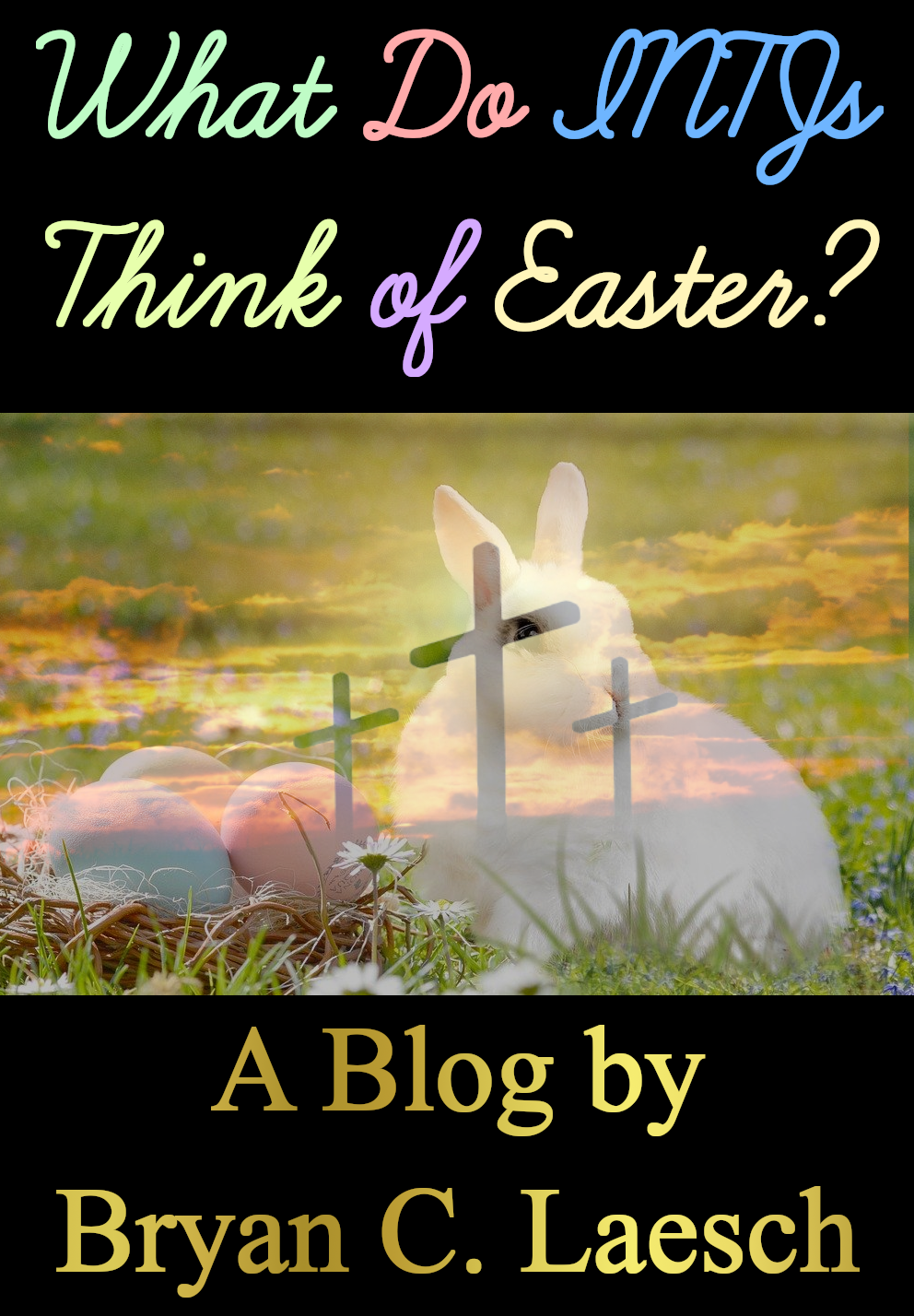Good news, everyone!
So, I’ve written blogs regarding INTJs and Christmas and INTJs and their birthdays, and, well, we have another major holiday coming up: Easter. So, why not try to answer the question what do INTJs think of Easter? As with any major holiday, there are a number of viewpoints to consider—I found three. Not a great number of perspectives, and there is some overlap between just those that definitely demonstrate the INTJ-ness of an INTJ.
1. The Non-Religious INTJ
For the non-religious INTJ, there isn’t too much to say. Easter is just another day. Maybe it offers some quality time with the family, and maybe it offers the opportunity for some marked down chocolate, but generally speaking, the non-religious INTJ won’t even notice the passing of Easter and will just treat it as any other Sunday.
2. The Religious INTJ
For the religious INTJ, Easter is a big deal—a real big deal. Sure, commercially speaking, Easter isn’t as big of a deal as Christmas, but for Christians, Easter is what Christianity is all about. Easter is the culmination of Christ’s mission here on earth. His passion, death, and resurrection are why he came here in the first place. So, for Christians, Easter is a really big deal, but even more so for Christian INTJs. But why so more for them than the other types?
 Well, it’s probably not just Christian INTJs for whom Easter is a bigger deal than most. I think all Intuitives as well as those with the Fi function in their stack can probably agree with the following sentiments. But anyway, the point of Christianity is to set aside your fallible humanity and become Christ-like, which means becoming perfect. Christ was the perfect man and he set the example we need to follow for perfection, so although we are called to live the Gospel every minute of every day, Easter is the example we are supposed to follow. It is the standard by which we are measured. By celebrating Christ’s passion, death, and resurrection, we are reminded of what it means to be Christian—the origin of our most cherished beliefs. And for those who take those beliefs as serious as the grave, Easter bears quite a lot of weight indeed.
Well, it’s probably not just Christian INTJs for whom Easter is a bigger deal than most. I think all Intuitives as well as those with the Fi function in their stack can probably agree with the following sentiments. But anyway, the point of Christianity is to set aside your fallible humanity and become Christ-like, which means becoming perfect. Christ was the perfect man and he set the example we need to follow for perfection, so although we are called to live the Gospel every minute of every day, Easter is the example we are supposed to follow. It is the standard by which we are measured. By celebrating Christ’s passion, death, and resurrection, we are reminded of what it means to be Christian—the origin of our most cherished beliefs. And for those who take those beliefs as serious as the grave, Easter bears quite a lot of weight indeed.
3. Familial INTJ
Now, while the religious and non-religious INTJs are polar opposites, the familial INTJ can be either. Chances are good that unless you’re the (unbelieving) head of your household, if you’re an INTJ with a family, or you’re still living with your family, even if you aren’t Christian, you still celebrate Easter to some degree. After all, the kids like it and it’s a good reason to get the family together and pig out on chocolate bunnies, eggs, and crosses.
 So, for the familial INTJ, Easter is a holiday, like Christmas, albeit not as big. But that throws into perspective the perspective INTJs have with holidays. On the one hand, they offer a break from the monotony of daily living, but on the other, they’re a disruption. INTJs have things to do, and days that involve (extra) time with the family, possibly time with the extended family, and pigging out on a lot of candy and delicious food can throw an INTJ off their equilibrium. INTJs are creatures of habit with daily responsibilities, and while they try to get as much done as possible when interrupted by a holiday, they don’t usually get everything done, which can be a blow to their self-esteem. So, on a holiday, not only are INTJs tired from spending extra time with the family as well as preparing for the big day, they’re also bloated from all the food, and they feel like failures for not getting everything done. It’s not a good feeling.
So, for the familial INTJ, Easter is a holiday, like Christmas, albeit not as big. But that throws into perspective the perspective INTJs have with holidays. On the one hand, they offer a break from the monotony of daily living, but on the other, they’re a disruption. INTJs have things to do, and days that involve (extra) time with the family, possibly time with the extended family, and pigging out on a lot of candy and delicious food can throw an INTJ off their equilibrium. INTJs are creatures of habit with daily responsibilities, and while they try to get as much done as possible when interrupted by a holiday, they don’t usually get everything done, which can be a blow to their self-esteem. So, on a holiday, not only are INTJs tired from spending extra time with the family as well as preparing for the big day, they’re also bloated from all the food, and they feel like failures for not getting everything done. It’s not a good feeling.
Similarities
So, are there any similarities between these three types of Easter INTJs? Well, with the non-religious type, no. With the religious and familial types, yes. To both of these INTJs, Easter is a big deal that requires hours of hard work to properly prepare for (Christian INTJs would have also had the season of Lent to contend with before Easter). It’s honestly sort of exhausting, partially because of all the anticipation for the big day and the expectation put upon you to either be a good Christian or a good family member. It’s actually a relief when Easter is over because you get to go back to your undisturbed routine. Never mind the stress of being both the Christian and familial INTJ—that’s a trial in and of itself that you become more and more weary of year after year. Never mind the juxtaposition of fasting and abstaining only to break it all with a giant feast at the end, which begs the question “did we really learn anything from Lent?”
When it comes down to it, Easter, and all major holidays for that matter, are a double-edge sword for INTJs, like I said above. Sure, things are easy for the INTJs who don’t recognize or celebrate those holidays, but for the ones who do or who have family that are expecting certain things from you due to the holiday cheer, Easter is a big-to-do that often leaves us feeling drained. I’m not going to say that I wish it didn’t exist (that would blasphemy for one such as I as I am a Christian INTJ), but I definitely wish there was a less disruptive way of celebrating it. Maybe it should be celebrated with a little more reverence due to whose day it is and why it is his day.
But what do you think? Is there another perspective that I forgot to include? Or was this just too generic for a blog? I apologize about it being short, but it really didn’t need to be long.
Thank you for your patronage.
Follow me on Social Media:
FB: https://www.facebook.com/bryanclaesch
IG: https://www.instagram.com/bryanclaesch/
Twitter: https://twitter.com/BryanofAllTrade
Pinterest: https://www.pinterest.com/bryanclaesch/

Eu sou INTJ cristã/familiar e gostaria que normalizassem a minha necessidade de celebrar essa data sozinha, ou parte dela só. Pois como é uma data dedicada a alguém, para mim especial, gostaria de ter um tempo para refletir, meditar, adorar, agradecer e rever minhas atitudes como cristã e depois, o almoço em família.